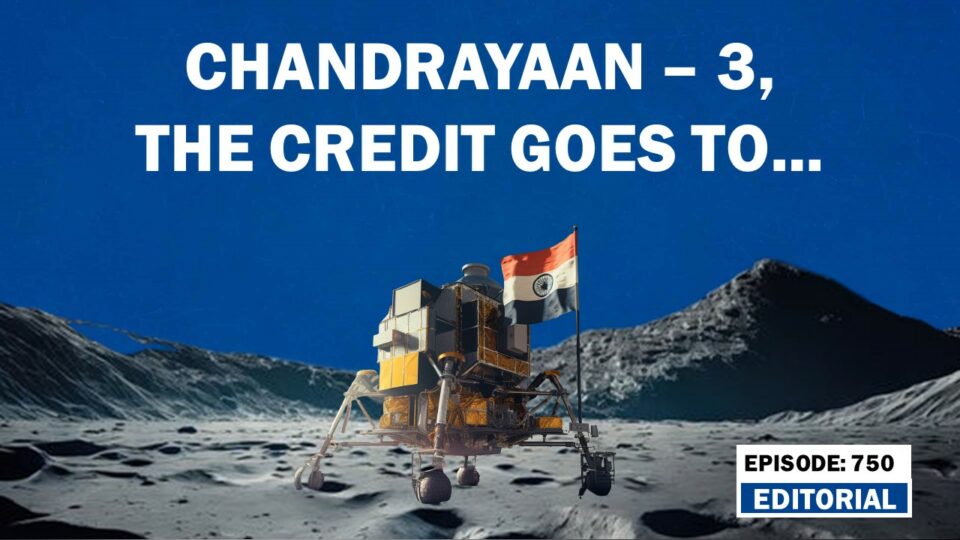Join Our WhatsApp Group: Sujit Nair Group
In this editorial episode, Mr. Sujit Nair celebrates India’s and ISRO’s accomplishments in the successful landing of the Chandrayaan-3 Moon Mission. Mr. Nair fondly remembers the significant contributions made by our nation’s leaders and scientists from 1947 to 2023. Following India’s independence in 1947, visionary politicians and scientists recognized the importance of space and rocket technology for the country’s progress. The first Prime Minister, Pandit Jawaharlal Nehru, saw great potential in rocket science and grasped the necessity of establishing a robust space policy. This was particularly relevant for a vast and developing nation like India. Nehru emphasized the significance of science and technology in the nation’s growth. When the USSR launched the first artificial earth satellite, Sputnik, people began to understand the potential of satellites. In response, Nehru placed space research under the jurisdiction of the Department of Atomic Energy (DAE) in 1961. The DAE, headed by the eminent nuclear scientist Homi J Bhabha, was founded for this purpose. Bhabha, alongside another brilliant scientist, Vikram Sarabhai, born on August 12, 1919, established the Indian National Committee for Space Research (INCOSPAR) in February 1962. Sarabhai assumed the role of Chairman, and under his leadership, INCOSPAR coordinated space research activities. The primary objective of INCOSPAR was to formulate India’s space program, taking over the responsibilities previously held by the DAE. Dr. Kalam was a part of the Indian National Committee for Space Research (INCOSPAR) and worked closely with Vikram Sarabhai, a renowned space scientist. The committee assumed the responsibilities of the Department of Atomic Energy in the field of space science and research. INCOSPAR made the crucial decision to establish the Thumba Equatorial Rocket Launching Station (TERLS) at Thumba, located at the southern tip of India. Dr. Kalam devoted over a decade of hard work as the project director for the development of India’s indigenous Satellite Launch Vehicle (SLV) at the Indian Space Research Organisation (ISRO). In 1980, under his leadership, India successfully deployed the Rohini satellite into near-earth orbit using the SLV-III, a milestone that made India a member of the exclusive space community. From the 1970s to the 1990s, Dr. Kalam played a pivotal role in the development of projects such as the Polar Satellite Launch Vehicle (PSLV) and SLV-III, both of which achieved success. During the 1970s, he also led efforts to develop ballistic missiles based on the technology derived from the SLV program. Following 1983, the Defence Research and Development Organization (DRDO) developed multiple missiles under Dr. Kalam’s leadership. Initiatives like Devil and Valiant aimed at harnessing the technology from the successful SLV program to develop ballistic missiles. Through the Kalam Mission, he successfully oversaw the creation of indigenous guided missiles, including Agni and Prithvi. In 1992, Dr. Kalam assumed the role of Scientific Adviser to the Defence Minister, later achieving the rank of a cabinet minister. In 1999, he was appointed as the Principal Scientific Adviser to the Government of India. He also served as the Chief Scientific Adviser to the Prime Minister and played a central role as the Chief Project Coordinator during the Pokhran-II nuclear tests. Under his leadership as the Secretary of the DRDO from July 1992 to December 1999, Dr. Kalam played a pivotal role in the Pokhran-II nuclear testing, ultimately earning him the reputation of being India’s premier nuclear scientist. The successful nuclear tests conducted at the Pokhran Test Range in May 1998, consisting of a series of five nuclear bomb test explosions, solidified India as a nuclear-armed nation. Dr. Kalam’s extensive contributions both politically and technologically were instrumental in the success of these tests.
#Chandrayaan3 #PMModi #ISRO #Chandrayaan #modi #moon #moonmission #india #indiatothemoon #nehru #indiragandhi #nambinarayan #abdulkalam
As an independent media platform, we do not take advertisements from governments and corporate houses. It is you, our readers, who have supported us on our journey to do honest and unbiased journalism. Please contribute, so that we can continue to do the same in future.

